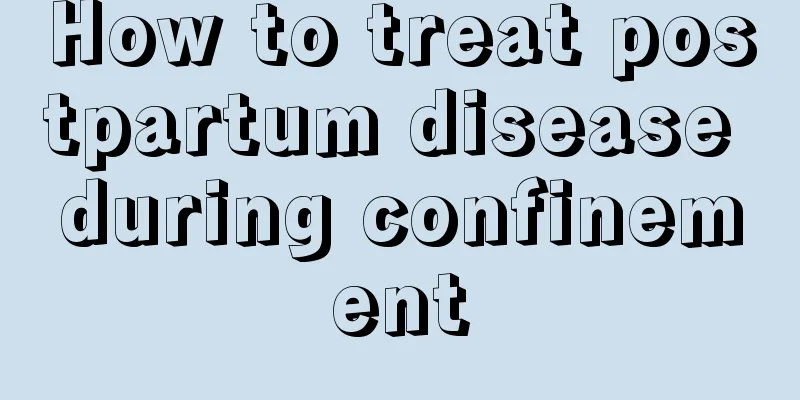How to treat postpartum disease during confinement

|
The Chinese people attach great importance to the confinement period for women. They are very afraid that if women do not take good care of themselves after giving birth, they may be left with sequelae. So how to treat postpartum diseases? When it comes to the treatment of postpartum illness, the safest approach is of course to ask an expert in this field to help with the adjustments. However, not every postpartum illness is serious, and you need to treat them differently to see which diseases need to be cured as soon as possible to reduce the harm caused by the diseases. In traditional concepts, confinement refers to a period of one month starting from the first day after delivery. During the period of confinement, women may suffer from "confinement disease" due to their weak bodies after childbirth and susceptibility to cold and evil spirits, as well as the influence of factors such as diet, sleep, and emotions. Regarding the diseases that women suffer from during the confinement period, Director Wang Yong said, "In modern society, because the country advocates giving birth in hospitals, the organic lesions of gynecological reproductive organs during the puerperium have been greatly reduced. Therefore, during the confinement period, most of the problems that remain are functional problems, and there are not many organic diseases." As for the treatment of postpartum diseases, experts say: "Postpartum, modern medicine calls it the 'puerperium'. The human body condition and body functions during the puerperium are different from those during pregnancy and non-pregnancy except the puerperium. It is a process of transition from normal physiology during pregnancy to non-pregnancy. The functions of various organs are changing. For example, the cardiovascular system, nervous system, reproductive system, endocrine system, etc. will change from a stress state to a normal physiological state. Then some functional diseases caused by this process, such as migraine, etc. When returning to a normal physiological state, some diseases are more difficult to solve. According to Chinese medicine, it is "leaving the root of the disease." How to treat postpartum diseases during confinement? Experts say that most postpartum illnesses can be slowly recovered through a period of adjustment, so there is no need for excessive treatment, which will lead to adverse consequences. Postpartum women can understand their own physical conditions, tell their family members in time when they feel unwell, receive treatment as soon as possible, and reduce the harm caused by postpartum diseases. |
<<: What to eat to enhance ovarian function?
>>: How to treat postpartum disease during the confinement period
Recommend
I got my period after taking the contraceptive pill.
Many female friends will encounter this situation...
Every autumn rain brings a chill. How should we deal with the drastic drop in temperature?
Recently, the Central Meteorological Observatory ...
Is it better to seal the balcony or not? What are the advantages and disadvantages of sealing the balcony?
We all know that the balcony is a special place i...
Are you one of the people at high risk of cancer?
Author: Professor Guo Tuankui, Department of Onco...
Vulvar itching after sex with husband
Sex is an indispensable part of married life and ...
Is scoliosis hereditary?
In today's society, scoliosis has become one ...
Brown liquid after my period
Many female friends have brown liquid after their...
Surgical treatment of breast calcification
The problem of breast calcification is quite seri...
What causes vaginal itching?
Vaginal itching is a common symptom. For friends ...
Could this thing that we use every day really cause cancer?
This article was reviewed by Chu Yuhao, PhD from ...
David ovulation test strips for early pregnancy
To put it simply, Peter's ovulation test pape...
I suddenly didn't have my period for a month, what happened?
Both the absence of menstruation are distressing,...
What is the cause of white discharge from nipples during pregnancy?
Many women are prone to white secretions from the...
Is breast hyperplasia dangerous?
For female friends, it is important to realize th...









